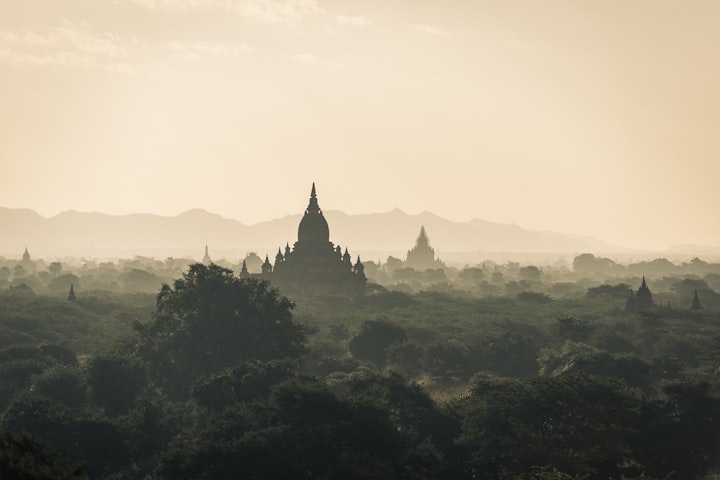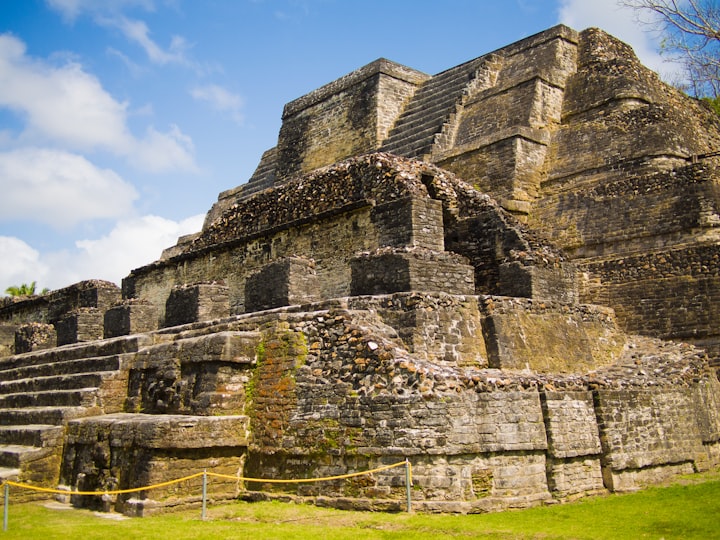
T. S. Eliot wrote, "Here is how the world ends, not with a bang but with a whimper." I do not know how the world will end, but I am beginning to understand exactly what he meant. I am old, so very old. I have forgotten more history than has been written about. I age slowly; you might think me a grandfather, perhaps a great-grandfather, but I am ancient beyond anything you have ever seen. Only the rocks and oceans are older than I am. You may not think they are alive, but I know better. Sometimes I feel the rocks have more life than I do. Soon perhaps they will.
I used to feel so vibrant when I was young, and the world was younger with me! Who but I can remember Athens, Thebes, or Rome? Only myself, perhaps a few others like me, if they still live. I have not sought for them in many years and believe myself the last. I cannot recall much of my childhood. I am not immortal, though it seems otherwise, and therefore I must have begun as other mortals do. I do not recall my parents well, and if I had siblings, I did not know them while I was young. I did search for others like myself occasionally but soon found they are solitary creatures, just as I have become. If I try hard to think of how old I am – well, I do not remember what you call the last ice age, so I believe myself to be younger than that. Or perhaps the memory is lost with so many others but serves to explain why I have always loved warm places best.
Your legends are real to me, recent enough that I remember them vividly. The hanging gardens of Babylon, for example: I strolled along their terraces on languid afternoons. The pyramids of Egypt, likewise, I saw built, though I could not explain the wonders of their engineering. Such things have never been my interest. (I admit, for all that I have seen in this world, most of my life has been in pursuit of pleasure and a bit of gossip that could be traded on.) I was fascinated by their beauty, yes, and by the hubris of the pharaohs who thought them fitting tombs for a god-king. It amused me that those who believed themselves divine were so concerned with the fate of the husks they would soon depart. More interesting to me was the brilliance of the artisans who prepared the cool, smooth stones and assembled them. They who were not god-kings knew they may not survive to see their work finished, let alone to weather the millennia. For me the key was in the idea, not the process, not thinking that in one, two, five thousand years that knowledge would be valuable, though how could I ever explain how it came to me? Yet it delighted me that these men were building something that I alone could truly enjoy. Now their monuments crumble even as I do.
Not everything I saw built has survived with me. I was dearly fond of Rome, devoted as she was to pleasures that even I took some time to tire of, yet there are only a few ruins left of the beauty I knew. It is also true that some things have lasted which I did not expect. A millennium and a half later, the Western world seemingly cannot get enough of a provincial British chieftain remembered by the name of Arthur. He was only noteworthy to me in his time for the rumor that some barbarian warlord was coming to repay Rome for leaving his tribes undefended against the Saxons. Rome was already at that time faltering, and perhaps an army seasoned and fearless enough to find its way there could have taken her, but the man fell while fighting both would-be usurpers and an outbreak of plague. He never reached my beloved city. I cannot honestly call such tales true or false, as I did not consider the western isles worth visiting until they came to their own ascendancy much later. The more fantastic later stories were spread at the time of another plague, coming from the courts at Troyes at the same time rumors were reaching us from the east of a sickness being carried toward us by merchants and returning crusaders alike. It is perhaps understandable that when women of rank were cut off from society for fear of disease spread by crusading knights, they should dream of being saved by yet more crusading knights. Yet, never did I know any as noble as that.
I too fell victim to that later plague, while living in Marseille. (How I adored Marseille! While the present city is of course newer, as a settlement it is at least as old as I.) Despite my extreme longevity, I am as subject to the caprices of disease and injury as anyone. Pure luck saved me, as it did some victims. I certainly believed at one point that I was dying. I found my entire body wracked with pain that defies any description one could understand who has not felt it. I could hold no food and indeed could not bear even to smell it. I had at that time a dear friend who kept me alive, though I was too delirious to understand what he was doing. It seemed to me that he was tormenting me, for I felt it would have been kinder to let me succumb to the sickness than to force me to endure it. On the fifth day, longer than many lasted, the swellings began to drain themselves in a great stinking mess. My friend kept me clean and dosed with enough good wine to keep me in quite a stupor. As I came out of the delirium, I still did not entirely comprehend what was happening around me. I never had a chance to thank him for saving my life. He spent himself nursing me and no sooner had I recovered than he himself grew ill and was dead within two days. I did the only thing I could, to give him a grave worthy of his sacrifice and walk away in search of a new place to settle for a time. I walked until I began to forget his face. I found that having recovered gave me immunity against future plagues, and several times, I repaid my friend’s sacrifice by nursing others. Many of those I treated died despite my efforts. Fortunately, in each plague there were some who were strangely immune, so at least I did not attract undue attention in this manner.
I returned often to walk the stone-paved avenues of Rome, stopping to rest in the shade of columns and statues. As in Egypt, I always admired those who spent their days working to create things that would outlive them. These men of Rome did so for the glory of the Republic, or later the Empire, and later still for the Church or a noble patron. The very efficiency and expediency of her architects and civil servants allowed the Empire to be created. Rome itself is so old and yet ever changing, so I often felt safe returning after only ten or twenty years. I would find myself in a new neighborhood among new people, often recently arrived from one of the outlying provinces like myself, and I found that I could insinuate myself into any situation I liked. Families fell in and out of favor, men were sent off to some new foreign posting and took their households with them, and there might be none left who remembered me from my last stay. And what if they did? I would have a different name, speak in a different accent, be recently arrived from some new territory, and I was only someone who looked much like that merchant from Dalmatia who visited so many years ago.
I was there at the time of Christ and I heard some rumors of some sort of rebel preaching to the natives of his province whom the authorities were keeping an eye on, but again I thought little of this. So often there were little revolts, easily crushed, that it was not worth paying them much attention. This one believed himself the son of a god, but I had made a true Roman of myself, and did we not have sons of gods in our legends? It was a common enough claim. I did not bother to travel to the east to learn more of him, as the rebellion would soon be stamped out and some other would take its place. Indeed, the rebel was arrested and put to death, but the story grew instead of diminishing. I decided I would eventually have to go back to that part of the world and hear more. Besides trading, maybe I could find a tale that could earn me a meal in the inns of those places where the new cult was spreading. I also visited on several occasions as a soldier, both with the army of Constantine and later during the Crusades. I made my way out of Jerusalem before it fell back to Saladin’s rule, however, as I saw which way the wind blew and had no desire to risk my head for tales and relics.
London I also grew to love when I saw it, but it clings too closely to itself for me to be able to live a public life there as often as I could have liked, and its weather was not suited to spending so much of my time walking outdoors and taking in all its places and people as I did in Rome. It was often just as full of intrigue, however, and for this reason I made more frequent short visits, mostly as a trader though occasionally as a low-ranking diplomat if I could attach myself to some nobleman’s service for a time. It would have made my life difficult if I had become recognizable to many, and all the gods forbid there should come to be a portrait of me hanging in some gallery! In Rome it had been easy enough to serve as a clerk and draw little attention, but once the days of the Republic had passed and Europe became entrenched in the feudal system, service had more of a way of leading to promotion. Thankfully there was no risk of becoming a noble myself, as with my uncertain background and pedigree I would never be sought as husband for a great heiress. I did enjoy the attentions of the occasional widow, some of them wealthy and others not, receiving a warm bed and meals in exchange for a few coins or work about the place. This type of arrangement also made it easier for me to disappear – I had arrived unknown on a ship and drew no comment if I were to leave the same way.
Many smaller towns I never revisited at all. So much the same, peasants and petty officials, always springing up and disappearing, what could be the point? Rarely did they offer anything beyond a meal and a place to sleep, news of a ship, or a chance to work for a few coins or traveling provisions.
And now, it is fitting that I should long for warmer places as they were in my youth, for I find that as age overtakes me, I grow cold. I sit alone and think of everywhere I lived and visited. Not only does one long to see as much as one can, and in so many years it is indeed possible to see nearly all that one wishes, but one must also avoid arousing suspicion. I could hardly remain in one place for sixty or eighty years and let generations of neighbors grow old and die while I barely aged. I have heard rumors attached to those others like me of whom I have been aware. They have been called vampire and monster, drinkers of blood and eaters of flesh, and destroyed for crimes no greater than attachment to a place or its people. It is a failing of human nature that people will always look for someone else to blame for their misfortune, and that blame will fall on those who seem to not share that misfortune. My lifespan is merely due to being an older breed, some quirk that was not passed on, but how does one explain that to a superstitious mob, to whom there was no difference between mythology and science, and for whom to die was often less brutal than living? Some still consider evolution and genetics a dubious theory at best, though I believe it does much to explain my condition. I have read in recent decades that viruses that do not spread easily are longer lived than those that do. Perhaps it is the same: my kind mature slowly and do not reproduce often, while those who produced more offspring did not need such long lives to build their population.
I tried at times to have some little happiness. I had several wives, and children with each of them. Yet I also left each of them within a few years, before they began to age, and I did not. The last was centuries ago, when I realized that the one thing I sought most was the thing I could not have – someone to share my secret. Perhaps it is only my weakness that I could not. Perhaps one of my wives might have accepted my explanation for why I seemed to stay young while they grew old and frail, rather than accusing me of witchcraft? When I could, I tried to locate my children and observe them as adults without identifying myself. Though those who died of what would have been considered natural causes did live long lives, I was glad to see that none inherited my extreme longevity. I have too often given up all that I cared for. I would not wish to pass this curse on.
I told some of this to my friend Michel, who nursed me through the plague. As he held my hand and sponged cool water over my brow and my lips, I spoke to him of the pyramids, of Israel in the days of the prophets, of the warring emperors of Qin. I told him of the wild horsemen I had traded with and how I first came to Rome when it was only a settlement of farmers and herders spread across seven hills. I also recall him saying to me, when you are well, you can go back to your books. Wherever I have lived, I tried to maintain a library so that I could study history, even that which I had experienced. It is difficult remembering that while many may know of certain events, after a number of years it is no longer wise to speak of them as a witness. I needed to learn what should and should not be said. I suppose Michel thought that in my delirium I believed myself to have lived through times I had only read about. Perhaps, if he had survived, I would have told him all of it. Would he have understood, or would he have fallen victim to superstitious fears about my nature and condemned me to the death that he had just saved me from? I recovered and he did not, and I never needed to make that decision.
There is none now to whom I would entrust my secret. I do not need a doctor to tell me I am dying, nor do I wish to spend what time I have left as a subject poked and prodded with needles and knives. As I intend to die in my room, alone as I have largely lived, there will be an autopsy when I am found. I do not know if such tests could reveal that I have lived for millennia. If, as I believe, I am the last of my kind, my death cannot put others at risk. If there are more like me, they have hidden well enough and should not fear. I have thought about making my way out to a desert, where my body might disappear in the sands, drying into a mummy so no one would question its apparent age. I have given this idea up however, as I am too weak to get very far. Such money and possessions as I have, above whatever it costs to bury me in the plot I have purchased, should be given to charities for maintaining old homes and landmarks. These are the only true love I have. I have heard stories of the Comte de Saint-Germaine, who supposedly amassed a great fortune over the centuries, but these are stories and no more. It has been difficult enough to carry a few books and necessities. How could I have thought that an Abyssinian bridle or a spear from Marathon would be worth the value of an entire farm after two or three thousand years? A bridle or a spear was something to use until it wore out or broke and was replaced by another made in much the same manner. It was not to be considered something of value when its usefulness was gone.
I have saved just enough to sustain me now that I can no longer work as a diplomat or trader as I did most of my life. It is just as well; one now needs documentation to hold a post of any importance or move about. I cannot prove my date or place of birth to obtain such papers. I have heard that it is possible to get high-quality documents from forgers, or perhaps issued by some corrupt individual working for a legal authority, but I have also heard that these are done at great expense, and I could not afford to do them as frequently as I would need. Throughout much of my life, many people never ventured more than a few miles from home. It was possible to create an entirely new existence a province or parish away. Now even if I had such documents as I would need, there is no guarantee that a move to another continent would eliminate the possibility of meeting someone who had known me recently by another name or occupation. Once or twice, usually near sleep, I have wondered if it is not so much my body but the world itself that can no longer sustain me. It does not matter. Longing for a time and place that no longer exist will not return the life I had then. I am too easily tired for the effort required to examine such thoughts.
I prepare to leave with but a whimper. This confession cannot begin to tell all the things I have seen, and I have neither time nor strength to tell it all. I am going to lie down, and wrap myself in my blankets, for I am so very, very cold.






Comments
There are no comments for this story
Be the first to respond and start the conversation.